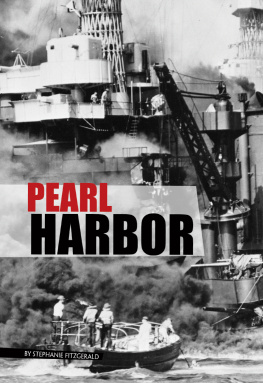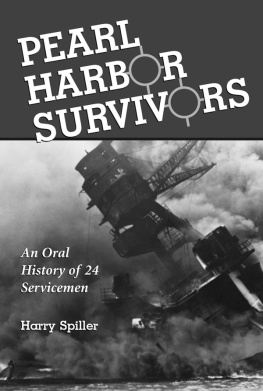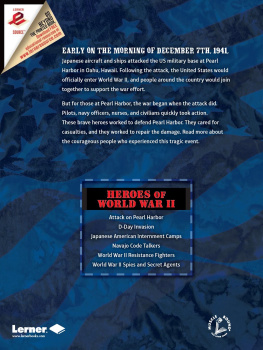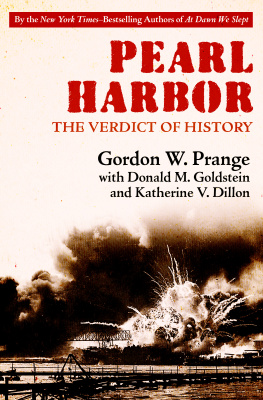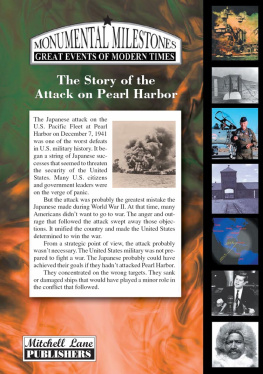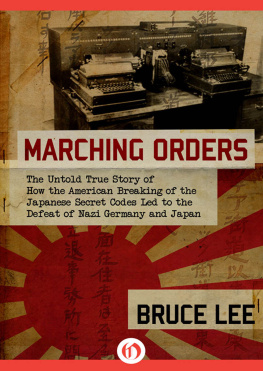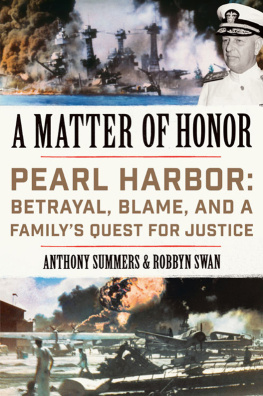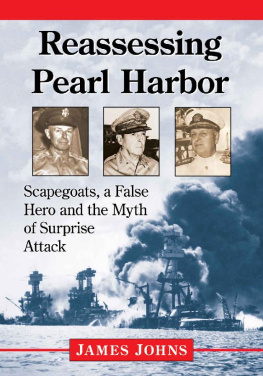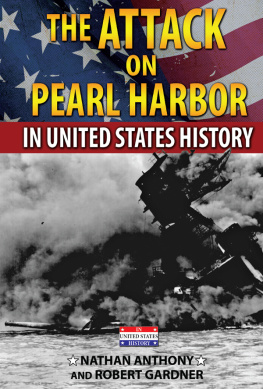Pearl Harbor: Final Judgement
The Shocking True Story of the Military Intelligence Failure at Pearl Harbor and the Fourteen Men Responsible for the Disaster
Henry C. Clausen and Bruce Lee

A wit once said:
Behind every successful man stands
a surprised mother-in-law.
But it was no surprise that Virginia was my devoted wife and loyal companion in my endeavors.
To her I lovingly dedicate this volume.
1 LEAVE NO STONE UNTURNED
I was born to survive calamitous events.
At least, thats what my mother always claimed.
Whenever she recalled the great earthquake and fire that destroyed San Francisco in 1906, she would tell everyone how I was only a few months old at the time and was snoozing on a Murphy bed when the quake hit. Instead of its usual reluctance to spring upright and tuck itself into the wall, with the first tremor the bed snapped itself back and held me securely against the strongest interior support while the exterior of the house crumbled away.
After the quake, when my parents finally managed to reach the bed and pull it down, there I was, looking somewhat startled, but otherwise happy and content. By another stroke of luck, I had even been turned right side up.
Such recollections were far from my mind in late November 1944, however, when as usual I rose with the sun. The war in Europe was going well. Our Allied forces were moving steadily forward on a broad front across Europe. The Canadians had secured the Beveland Peninsula and the entrance to the vital port of Antwerp; the British Second Army was mopping up the Geilenkirchen salient after heavy fighting; and the American Third Army, under General Patton, was about to penetrate the Maginot Line. In Italy, the British and the Americans were driving steadily north along the Mediterranean coast, while on the Adriatic side of the peninsula, the Canadians, Poles and British were advancing on the city of Ravenna. Meanwhile, the Russians were moving toward Budapest after having driven the Germans out of Romania. In the Pacific, the American Navy was celebrating its victory in the Battle of Leyte Gulf, in which it had sunk the last of Japans aircraft carriers.
I cannot recall the exact date, but that morning in Washington, D.C., the sun was bright. The citys foliage was at its best: a rich green-gold, yellow and burnished bronze, electrifying in its beauty. I looked longingly at the golf clubs standing in the corner of my bedroom, especially at the new putter with which I had been practicing with great success, and I thought of a number of schemes I might employ to escape from my office at the Pentagon and hit the golf course.
I could almost hear my ball drop into the cup of the eighteenth hole, and I could feel the crisp dollar bills that I would win when I remembered that I was supposed to meet that morning with Brig. Gen. Carter Clarke, the Assistant Chief of Staff, G-2 (Army Intelligence). My heart sank. I didnt realize it, but I was about to be dropped into some truly calamitous events.
As a Major in the Armys Judge Advocate Generals Corps, I had recently served as the Assistant Recorder to the Army Pearl Harbor Boards investigation, during the period July 24 to October 19, 1944, into the greatest military defeat in American history. Some unusual things had occurred during this investigation, and after the Board submitted its final reports, it became apparent that information had been withheld from the investigating officers. I also suspected that the Board had been given tainted testimony. I didnt know exactly what information had been withheld, nor did I know the extent of the questionable testimony given to the Board. But I had been asked to investigate.
My mission this day on behalf of the Armys Judge Advocate General was to gain access to and review the Japanese radio messages the Americans had intercepted and which had been given to the Army Board as evidence. I was a relative newcomer to this code breaking, and I needed the messages to supplement a study that Col. William Hughes and I were writing on the findings and recommendations of the Army Pearl Harbor Board for a report that the Judge Advocate General would submit to the Secretary of War, Henry L. Stimson. Although I sat on the Army Board as a Recorder, I had never seen the intercepts and I needed to know what they said. In turn, Stimson would make his report to Congress and the nation about what had gone wrong at Pearl Harbor.
The man who held the key to the decrypted messages I needed to review was General Clarke. I suspected that he had been involved in whatever hanky-panky had taken place with the Army Board, and I knew he was going to be a hard nut to crack. His office was famous for never giving out any information, even the time of day.
In those days, only a tiny number of people knew about our having broken the Japanese codes before Pearl Harbor. Nor did the public know that General Clarke, as Commander of the Armys Communications Intelligence Operations, had been the courier between the Armys Chief of Staff, George C. Marshall, and the Republican presidential candidate, Thomas E. Dewey, in the election of 1944. Somehow, I am not sure how exactly, Dewey had learned that the United States had broken the Japanese codes before Pearl Harbor. His campaign strategy was obvious: to charge that the administration of President Franklin D. Roosevelt had been aware of the Japanese intentions to attack Pearl Harbor but had done nothing to prevent it. In turn, this brought America into the war against the Axis powers, which Roosevelt had wanted and the Republicans had been trying to prevent. Needless to say, if Dewey followed this strategy, he would probably win the election.
However, General Marshall feared that a presidential campaign revealing the greatest secret of the war, that we had broken the enemys codes (those of both Japan and Germany), would endanger the Allied war effort, to say nothing of starting a bitter political struggle between Republicans and Democrats. It might needlessly cost thousands upon thousands of Allied soldiers lives, plus prolong the war, if not make our goal of unconditional surrender by the Axis impossible.
So Clarke had carried a special message from Marshall to Dewey, in which Marshall asked Dewey not to discuss the issue of breaking the Japanese codes during the campaign. A true patriot, Dewey acquiesced to the Chief of Staffs request. It cost him the election. Roosevelt won an unprecedented fourth term in office that November 1944. (The nation had no idea how ill Roosevelt was at the time.)
I knew that Clarke had an explosive temper. Although quite a decent person, he laced his language with frequent bursts of profanity. He was tall, with a great shock of black hair that sometimes streamed like rivulets over his ears and forehead. From experience in dealing with him, I expected that if I was going to get the documents I needed, Id have to slug it out, toe to toe.
I was pleasantly surprised when I entered Clarkes office and he said, Clausen, how the hell are you? Take a seat.
I sat, and then reminded him about our earlier phone conversation, that Colonel Hughes and I were reviewing the Army Pearl Harbor Boards findings and that I needed to check the decrypts.
Ordinarily, Id tell you to go to hell, Clarke replied with cheerful good humor that amazed me. If the Japs ever learned wed broken their Purple codes, it could cost us the damn war. But Ill level with you. Before you came, I checked with a higher authority. I was told to give you whatever you wanted and to cooperate fully. I dont understand why. I think its dead wrong.


